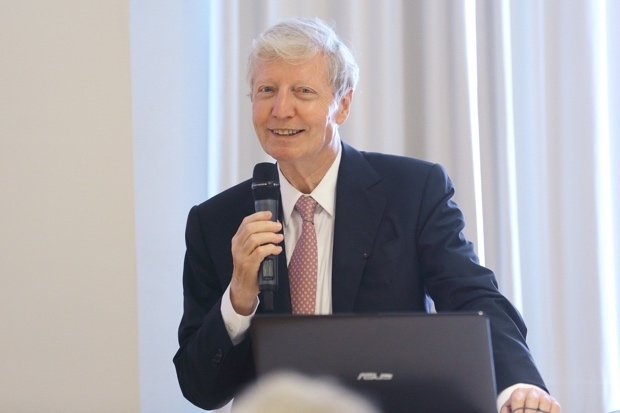澳門科技大學十九周年校慶之榮譽博士學位頒授典禮於2019年3月27日於大學d座禮堂隆重舉行。澳門特別行政區政府社會文化司司長譚俊榮博士親臨主禮,為頒授典禮大增光彩。
榮譽博士學位頒授典禮上,澳科大向何厚鏜先生、拓跋賀教授(prof. witold pedrycz)、袁國勇教授、賀定一女士、朱爾斯•霍夫曼教授(prof. jules a. hoffmann)、彼得•亞瑟•戴蒙德教授(prof. peter arthur diamond)、姚期智教授、河村建夫先生(mr. takeo kawamura)共八位世界傑出人士頒授了榮譽博士學位。澳科大校友總會也迎來了八位在不同領域建樹非凡、功勳卓越的校友。
與有榮焉的同時,讓我們一起領略榮譽理學博士——朱爾斯·霍夫曼教授的風采:

朱爾斯·霍夫曼教授讚詞:
免疫之門得開啟,
基因善業觀複來。
朱爾斯·霍夫曼教授是法國斯特拉斯堡大學生物學研究所所長和法國國家科學研究院榮譽院長,致力於研究昆蟲先天免疫細胞、免疫反應遺傳和分子機制。霍夫曼教授及其團隊為發現和解釋有機體對抗傳染因數的防禦機制提供了開創性的見解,證實了昆蟲與人類先天防禦機制的保護體系,促使學界對哺乳動物的先天免疫系統作用重新進行評估。霍夫曼教授和同事們的研究發現:鐸樣受體(tlr,即toll like receptors,鐸基因家族的名稱源自德語“toll”,有“令人驚歎、偉大”之義)在識別感染源、激活免疫反應中具有關鍵作用,由此引發了全球生物學家在發育遺傳學和先天免疫學方面的持續研究,相關成果對於人類病理學研究以及針對人類記憶、行動、睡眠和營養現象的研究同樣大有裨益。由於霍夫曼教授在toll基因免疫活化關鍵原理領域的貢獻,他與布魯斯·博伊特勒和拉爾夫·斯坦曼一起,於2011年榮諾貝爾醫學獎。諾獎評委會稱讚獲獎者“發現了免疫的‘守門人’,從而徹底革新了我們對於免疫系統的認識”。
霍夫曼教授生於盧森堡,1969年於法國斯特拉斯堡大學獲得博士學位,在德國馬爾堡大學完成博士後研究後即回到法國,在母校斯特拉斯堡大學開展研究工作。霍夫曼教授於斯德拉斯堡大學“動物學研究所”內創建了“昆蟲內分泌學和免疫學” 實驗室(現隸屬於“分子與細胞生物學研究所”),並於1994年至2006年擔任該實驗室主任,直至今天仍然帶領合作者進行研究。2007至2008年,他擔任法國科學院院長。同時也是歐洲分子生物學組織、德國國家科學院利奧波第那科學院和俄羅斯科學院成員,以及美國國家科學院、美國文理科學院和美國腫瘤研究協會外籍會員。由於其在免疫研究領域的卓越貢獻,除諾貝爾獎之外,霍夫曼教授及其同仁還獲得了諸多獎項,包括羅伯特科赫獎(2004年)、巴爾贊獎(2007年)、羅森斯蒂爾獎(2010年)、慶應醫學獎(2010年),蓋爾德納國際獎(2011年)和邵逸夫生命科學與醫學獎(2011年)、法國國家科學研究院金獎(2011年)。2012年,霍夫曼教授榮獲法國國家榮譽勳章和法國學術院院士“不朽者”稱號,這一稱號來自法國學術院創始者刻在印章上的名言——“獻給不朽”,是法國學術界的至高榮譽。
citation for professor jules a. hoffmann
prof. jules a. hoffmann discovered the ‘gatekeepers’ of immunity and led the world to new understandings of the immune system.
prof. jules a. hoffmann is the chair for developmental biology at the university of strasbourg institute for advanced study and emeritus research director at the national center of scientific research (cnrs), france. he dedicated much of his work to the study of the cellular, genetic and molecular mechanisms responsible for innate immunity in insects. the work of prof. hoffmann and his associates has provided new insights into the defense mechanisms that organisms, from the most primitive up to humans, employ against infectious agents. by demonstrating the marked conservation of innate defense mechanisms between insects and humans, the work initiated by prof. hoffmann and his collaborators has led to a re-evaluation of the role of innate immunity in mammals. more generally, the drosophila model, which asserts the key role of the toll gene in sensing infection and triggering immune responses, has enabled biologists throughout the world to make considerable progress, not only in developmental genetics and innate immunity, but also in the study of certain human pathologies and in the understanding of memory, behavior, sleep and nutrition phenomena. with bruce a. beutler and ralph m. steinman, prof. hoffmann was awarded the nobel prize for medicine for “their discoveries concerning the activation of innate immunity” in 2011, cited by its committee to have discovered the ‘gatekeepers’ of immunity and revolutionized our understanding of the immune system.
prof. hoffmann was born in luxembourg. he obtained his ph.d. at the university of strasbourg in france in 1969. after two years’ post-doc research at the philipps university of marburg, germany, he returned to the university of strasbourg to continue his research work. he went on to set up the cnrs laboratory of “endocrinology and immunology of insects” first within the institute of zoology of the university of strasbourg and then within the cnrs institute of molecular and cellular biology in strasbourg, which he directed from 1994 to 2006 and where he still works with some of his collaborators. he was president of the french academy of sciences in 2007 and 2008. he is a member of the european molecular biology organization and a member of the german national academy of sciences leopoldina and the russian academy of sciences. he is a foreign associate member of the academy of sciences of the united states of america, of the american academy of arts and sciences and of the american academy of cancer research. for his contributions to innate immunity discoveries, prof. hoffmann was awarded numerous prizes, including, in recent years, the robert koch prize (2004), the balzan prize (2007), the rosenstiel award (2010), the keio medical science prize (2010), the international gairdner award (2011) and the shaw prize in life science and medicine (2011). he also received the cnrs gold medal in 2011, and in 2012, he became officier de la légion d'honneur in france and was chosen as an immortel at the académie française (french academy), which comes from the inscription, “to immortality”, on the seal given to the french academy by its founders and considered a supreme honour in the french academia.